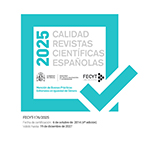Aprendizaje Basado en Proyectos en los grados de Pedagogía y Educación Social: “¿Cómo ha cambiado tu ciudad?”
Resumen
Durante los cursos 2010/2011, 2011/2012 y 2012/13, un 20% del tiempo de trabajo y de la calificación de la asignatura Sociología de la Educación en los grados de Pedagogía y Educación Social de la Facultad de Filosofía y Ciencias de la Educación de la Universidad del País Vasco se ha dedicado al Aprendizaje Basado en Proyectos. El objetivo ha sido diseñar, probar y evaluar una experiencia de innovación y mejora docente para trabajar las competencias de la asignatura por medio de metodologías activas y participativas. Se trata de que los alumnos empiecen a practicar ejercicios de sociología aplicada y trabajar competencias que será importantes en su labor profesional como educadores: “saber analizar científicamente la realidad social”, “escribir informes científicos”, “comunicación oral” y “trabajo en equipo”. El diseño del ejercicio supone la preparación de las Guías del Profesor y del Alumno, especificando la contextualización del proyecto, los objetivos del mismo, el enunciado o escenario, la justificación, los temas de la asignatura con los que se relaciona, la carga de trabajo prevista, los conocimientos previos que se requieren, las actividades previstas, los entregables, los recursos que se utilizarán, los sistemas de evaluación, el cronograma, etc. En nuestro caso, el ejercicio se basa en la siguiente pregunta motriz: “¿Cómo es, y cómo ha cambiado, la educación y su contexto social, en vuestro barrio, pueblo, ciudad o comarca?”. Los resultados, utilizando como indicadores las notas y las opiniones de los alumnos, son positivos: el Aprendizaje Basado en Proyectos posibilita la participación activa del alumnado, el contacto con la realidad y el aprendizaje significativo para el futuro profesional de los alumnos.
Descargas
Descarga artículo
Licencia
La Revista Complutense de Educación, para fomentar el intercambio global del conocimiento, facilita el acceso sin restricciones a sus contenidos desde el momento de su publicación en la presente edición electrónica, y por eso es una revista de acceso abierto. Los originales publicados en esta revista son propiedad de la Universidad Complutense de Madrid y es obligatorio citar su procedencia en cualquier reproducción total o parcial. Todos los contenidos se distribuyen bajo una licencia de uso y distribución Creative Commons Reconocimiento 4.0 (CC BY 4.0). Esta circunstancia ha de hacerse constar expresamente de esta forma cuando sea necesario. Puede consultar la versión informativa y el texto legal de la licencia.











